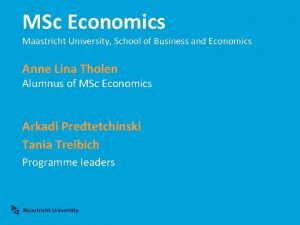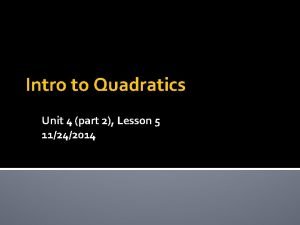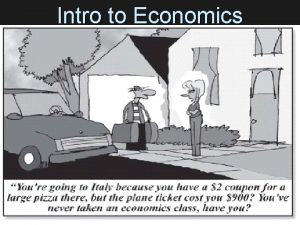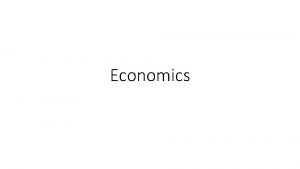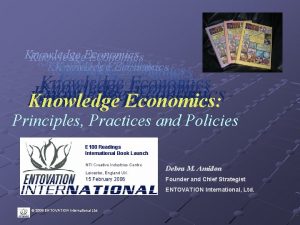Intro to Economics What is Economics Economics is









- Slides: 9

Intro to Economics

What is Economics? Economics is a social science that studies: • How individuals, governments, and businesses make decisions • Choices of how to get the most from limited resources • The consequences of those decisions Economics gives us a new set of lenses through which to see the world, we call this the “Economic way of thinking”.

The Economic Way of Thinking Principle #1: Everything has a cost “There is no such thing as a free lunch”, or in other words nothing is free. Every action costs something: time, effort, or the lost opportunity to something else. We call these things opportunity costs So, even when it seems that we are getting something for free, everyone of our actions has some kind of cost!

The Economic Way of Thinking Principle #2: People choose for good reasons We constantly face choices, and we usually choose the alternative that gives us the best combination of costs and benefits. Our choices also depend on our values. (Ex. Do I want to go out to the movies with my friends or stay at home with my family? ) Businesses and governments do not make decisions people do.

The Economic Way of Thinking • Principle #3: Incentives matter! – – – Incentives are costs or benefits that make us behave in predictable ways. Even though we tend to think incentives as positive, (ex. If you are good this month we get a free day) they can easily be negative. (ex. If you do not clean your room you cannot hangout with your friends) Any other examples of negative or positive incentives?

The Economic Way of Thinking Principle #4: People gain from voluntary and fair trade. People should only trade when they believe that trade makes them better off. In order for people to trade, they should have the right information and resources to ensure that they are making the right decision.

The Economic Way of Thinking • Principle #5: Economic thinking is marginal thinking – – Marginal choices involve the effects of additions and subtractions from your current conditions. Ex. How are you going to feel if you eat one more candy bar? • • If you are still hungry and have a sweet tooth, then you will probably choose to eat another candy bar because it will bring you pleasure. But, if you are full then eating another candy bar might make you feel sick, therefore you will probably not eat it.

The Economic Way of Thinking • Principle #6: The value of a good or service is affected by people’s choices. – – We give products their value, not companies. If nobody wants a product, it is going to be hard to even give the product away. If everyone wants it then the product has value and can be sold at higher prices. Jordans are not expensive because they are better than every other shoe, they are expensive because they are in high demand.

The Economic Way of Thinking • Principle #7: Economic actions have secondary effects. – – Our actions may have unintended consequences. Example: In some NYC neighborhoods rent was getting so high that the city decided to establish rent controls to keep them from rising. Because of this more people began to buy apartments which created a shortage. Also, landlords were not repairing or maintaining their apartments because it was no longer profitable. So once luxurious apartments were not dumpy.
